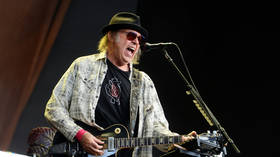The one guaranteed outcome of Spotify’s Joe Rogan problem is more censorship

Spotify is in turbulent waters. Its market capitalisation dropped some $2.1 billion within three days after rock legends Neil Young and Joni Mitchell demanded it remove its most popular podcast, ‘The Joe Rogan Experience’, from the platform because of the alleged spreading of fake pandemic information. After Rogan issued an apology of sorts via Instagram, Spotify’s share price shot up 12%, recovering the earlier lost ground even after Young withdrew his music.
The volatility facing Spotify is the outcome of its risky shift to podcasts. The $100 million it paid to Rogan to make his show exclusive to Spotify in 2020 is one of numerous deals the company has made with other equally divisive figures such as Kim Kardashian, Prince Harry, and even former President Barack Obama.
The problem with this shift is that it moves Spotify into the realm of a publisher, and not just a platform for artists. This distinction is critical, because it highlights why this particular stand-off is different from most other clashes between creators and tech platforms.
‘The Joe Rogan Experience’ shows how Spotify is attempting to move its business into higher-margin content-based services. The deal with Rogan is exclusive. No other app or service can carry the podcast. While Spotify cannot escape responsibility for the content of each show, it does have leeway at present, because a music subscription service still underpins its business. Provided there are no mass cancellations of these subscriptions, Spotify is less vulnerable to threats made by advertisers, under woke pressure from the public, than other platforms such as Facebook, for example.
But Spotify’s Achilles heel is its present reliance on stars and the need to have popular hits in its catalogue. In theory, musicians with enough firepower could force change simply by threatening to remove their albums – something Neil Young and Joni Mitchell have done, but which has not had any significant impact so far. If an artist such as Coldplay or Beyonce decided their following was strong enough to endure an exit from Spotify over anti-vax messaging on a podcast, the damage would be acute.
As music studios control most streaming music, the stars can now exert more control than before. With competitors breathing down its neck just ready to opportunistically grab any defectors or detractors, Spotify is seriously exposed.
All it takes is for one self-aggrandising woke artist of Neil Young’s ilk to start the ball rolling. The irony of this is breathtaking: not only is Young, once a leading anti-establishment free-speech warrior, now an agitator for capitalist censorship, but his rhetoric against genetically modified organisms – captured in his baseless anti-scientific 2015 album ‘The Monsanto Years’ – helped fuel a narrative that has made it easy to spread fear and distrust about Covid vaccines years later.
Joe Rogan merely hosted guests who made ludicrous claims about vaccines. His only advocacy was that children were not in imminent danger and thus did not require vaccines – a claim, if anything, based on science, not conspiratorial thinking.
The hypocrisy and irony would be hilarious if the implications were not profound. In this battle over tech platform business models, one future outcome is guaranteed: more censorship and content restrictions. This is not doom-laden speculation. It has already happened.
In response to the controversy, Spotify’s CEO, Daniel Ek, put out a statement recognising that the company has “a critical role to play in supporting creator expression.” While not wanting Spotify to become a “content censor”, he assured everyone that it would make sure “there are rules in place and consequences for those who violate them”.
This is no idle promise or just a PR stunt. Spotify’s robust policies against ‘misleading’ content have already resulted in the removal of more than 20,000 podcast episodes related to Covid-19 since the start of the pandemic. Without knowing what was in those podcasts, this revelation should be a significant cause for concern, for it shows that in the battle over future profits, censorship will be the norm rather than the exception.
At present, Spotify is sticking with Rogan. As we can see, this is not driven by any principle of defending free speech or freedom of creative expression. It is a pragmatic profit-driven stance that will be reversed if more stars join Young’s bandwagon.
The real growth industry underpinning all this is the rise of wokeness and its naive political belief that unaccountable Big Tech has the moral authority to censor and determine what can and can’t be produced or uttered in the public square of the 21st century. By pleading with a huge corporation to silence people he doesn’t like, Neil Young has strengthened the hand of the woke warriors. We should all be very worried.
The statements, views and opinions expressed in this column are solely those of the author and do not necessarily represent those of RT.














